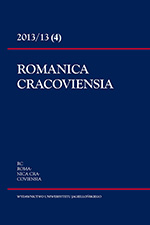Sintesi di un percorso ermeneutico nel canto XXVI dell’Inferno di Dante
Synthesis of a hermeneutic route in the canto XXVI of Dante’s Inferno
Author(s): Marino Alberto BalducciSubject(s): Language and Literature Studies
Published by: Wydawnictwo Uniwersytetu Jagiellońskiego
Keywords: Dante; Divine Comedy; Inferno; Ulysses; Dido; Horace.
Summary/Abstract: The Virgilian oratio suasoria addressed to Ulysses in Dante’s Inferno is here interpreted like a high-style speech in Greek, which ironically uses poetical Latin expressions typical of the character of Dido in love. Ulysses’ figure is than analyzed referring to the comical model of the second Satire by Horace, a clear (and never studied so far) Dantean source. This last shows the sovereign of Ithaca as the deceiver of a group of old people with clouded intellects, with the intention of stealing their patrimony. Ulysses’ deceit is a sin for Dante, but this Greek hero is more responsible because of his irreverent ape-like laughter in front of the mountain of Purgatory as a concrete and symbolic manifestation of infinity. Going beyond the boundaries of human rationality can not be a fault for Dante and his Christian mind, because it is always necessary for him to transcend our limited state, longing for divinization. The real responsibility of Ulysses is therefore his movement towards Mystery without humbleness. This last is indeed a complete denial of the self that this Greek spirit does not know, totally lacking the necessary listening disposition.
Journal: Romanica Cracoviensia
- Issue Year: 13/2013
- Issue No: 4
- Page Range: 237-244
- Page Count: 8
- Language: Italian

